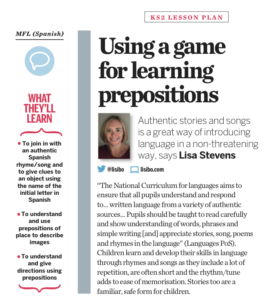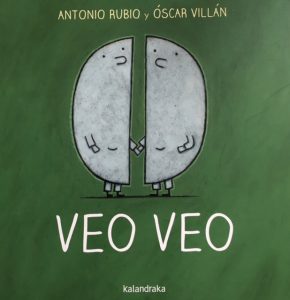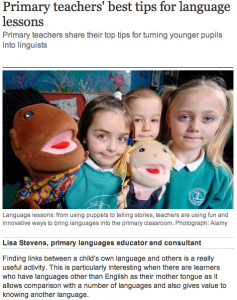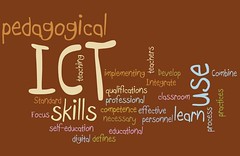 Following on from a mentions here and here and a short review, I had my first article published in The TES today! So exciting!
Following on from a mentions here and here and a short review, I had my first article published in The TES today! So exciting!
Here’s the link to the article as it appeared. The original text is below – doesn’t look like it was edited much, a fact about which I am very chuffed!
I emailed Whitehouse Common immediately and told them – and within minutes it was on the school website.
Lots of lovely tweets too – thanks to @valleseco whose tweet was the first I knew of publication, and @bellaale @IrisConnect @davidErogers @matttodd1 @NajmC @suzibewell @whcps @bootleian @bgflnews @chrisfullerisms @TaskMagic @dughall and anyone else who’s tweeted it since I wrote this post!
Hope this won’t be my last article…
Me gusta / Je t’aime / Ich mag / ???
What do learners like doing in MFL? Lisa Stevens ponders this and reflects on activities that her primary school pupils have enjoyed.
When I think back to my best experiences as a learner, they were memorable because they captured my attention and imagination. And it seems that many other learners have a similar experience.
I asked my pupils aged 3-11 what they enjoyed about learning languages, and they came up with many ideas. A class I taught in Reception who are now in Year 3 always want to play a memory game involving painted toenails because a member of their class holds the school record for the game (he was 4 when he set it!), and a Year 6 group remember retelling the story of El Nabo Gigante (The Enormous Turnip) when they were in Year 2 with silly hats and actions.
These were one off examples – when I asked a group of year 6s, they were more general, listing singing, rhymes and chanting as a favourite activity because they don’t do that in other lessons. They also said that they could better remember things that they had learned this way as they recalled the tune or the rhythm as well as the words. Towards the end of Year 6 we do a unit on a Spanish café and one activity involved rewriting a song about ordering in a café to the tune of The Twelve Days of Christmas. The task involved recalling vocabulary but was more then that as learners had to consider whether the rhythm of the words they were suggesting fitted the tune, making them concentrate on stress patterns and syllables. It also offered the opportunity to be imaginative as each group wanted to be the most original and perhaps funniest.
This type of creative task, using language in ‘unusual’ ways, is popular in other year groups too. In response to the story ¡Fuera de aquí Horrible Monstruo Verde! (Go away Big Green Monster), Year 3 used 2D shapes from their Maths lessons to create faces, feature by feature with a photograph taken at each stage. They then to wrote their own (simplified) version of the story saying hello to each new facial feature then telling it to go away using the photographs to create a comic strip. The sense of achievement – “I wrote a story in Spanish!” – was echoed in Year 5 when they rewrote a section of a famous Spanish poem, La Primavera by Antonio Machado, then went on to write their own poems about seasons in Spanish. Many of them were unsure about writing poems in English let alone Spanish, and here the language learning fitted well with their Literacy lessons. Year 4 were equally proud of their work in Healthy Heroes week, creating Superheroes Saludables (Healthy Superheroes), and building on their previous learning about sport and food in Spanish to create a clean living hero and unhealthy enemies. They did something no other class had done and, in a theme week, that holds great sway.
What do all these activities have in common? They were all led by the learners, all involved independence and imagination, and they all involved a challenge. The learners enjoyed themselves, feeling a sense of achievement when they’d finished, and I enjoyed ‘teaching’ them as each learner was able to stamp their individuality on the task.
Lisa is a Primary Language educator and consultant. She is PLL and International coordinator at Whitehouse Common Primary School, and works with her LA (Birmingham) as a Language Coach supporting schools with their language provision. She is an Apple Education Mentor, an eTwinning Ambassador and BGfL MFL Curriculum Associate, and is on the Spanish Committee of ALL.
(I know – that’s not all strictly accurate, but it was when I wrote the post!)








